The Planetary Vision of Soviet Russia’s Great Modernist Novel
Andrey Platonov’s masterpiece Chevengur imagined a politics of solidarity that placed at its center the health of the planet.
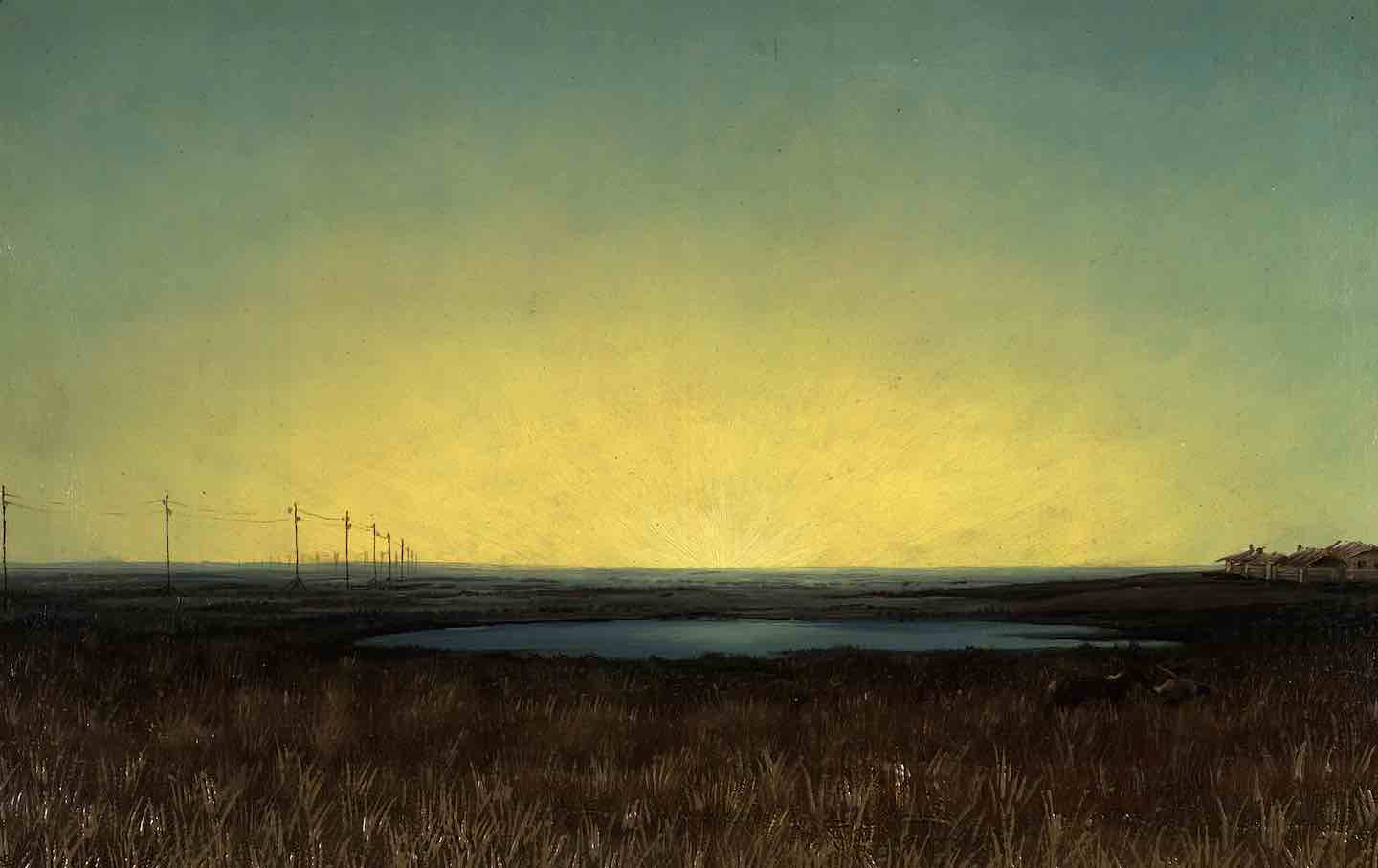
View of the Barabinsk Steppe Near Kainsk City, 1880-1897.
(Photo by Heritage Art / Heritage Images via Getty Images)
In 1929, at the age of 30, Andrey Platonov—the proletarian writer, land reclamation engineer, and founder of peasant communes in the Voronezh region of Russia—completed the novel Chevengur. The book can be described as a Soviet Don Quixote centered on the journey of two protagonists as they establish Soviet power in rural Russia after the country’s civil war of 1917 to 1923. These heroes are the young communist Sasha Dvanov and the peasant Bolshevik Stepan Kopionkin, who rides a horse named the Strength of the Proletariat and is inspired by the memory of his Dulcinea, the murdered revolutionary Rosa Luxemburg.
Books in review
Chevengur
Buy this bookBoth our own contemporaries and those of Platonov have attributed contradictory meanings to the novel. In the range of interpretations, some have understood it as a philosophical meditation on communism similar to Plato’s Republic. Others have read it as a Christian critique of modernity, while still others have viewed it as a study of the eschatology of Bolshevism and a homage to the failure of South Russian and Ukrainian anarchism. These contradictory meanings emerge from the novel’s intricate structure and its branching system of characters spanning three generations of people who live in a borderland between Central Russia and Eastern Ukraine. The geography of Chevengur is of crucial importance in understanding what this text devoted to a Russian revolution of the spirit is about.
The protagonists of the novel are the wandering peasants and nomads of unknown ethnic origin whose story begins before the Russian Revolution, as they return from seasonal work in the mines of the Donbas, in Ukraine, and the factories of Moscow. This flow of migrating people continues during the revolution and after the Russian Civil War as the same demographic groups pass through the Voronezh and Belgorod regions, ending up gathering in the imaginary city of Chevengur, where some of the migrants decide to settle and proclaim the arrival of communism. Although the nomadic characters of the novel are linked to Dvanov and Kopionkin in one way or another, their actions and storylines often constitute fairly autonomous novellas within the novel. The latter part of the novel moves away from the linear narrative of a conventional plot and becomes an intense meditation on what communism is and whether it can be established in the rural steppes—and if so, why the places most hidden from state power can nonetheless experience the horror of communism’s excesses in one village.
Robert and Elizabeth Chandler’s eagerly awaited new English translation of Chevengur does full justice to its philosophical complexity and linguistic density. In the novel’s first pages, we are introduced to the pre-revolutionary life of peasants fighting famine in the village where Dvanov was born. The attitude of this generation to revolution is shown as a spectrum ranging from the pragmatic skepticism exemplified by Zakhar Pavlovich to the intuitive anarchism of Yakov Titych, a sort of Tolstoyan peasant living in Chevengur.
Platonov elsewhere referred to the post-revolutionary generation as the cripples of imperialism and capitalism. The First World War and three Russian revolutions have left their mark on the generation that stands in the middle between the train mechanic Zakhar Pavlovich and Dvanov. The violent pangs that gave birth to communism in Chevengur have involved summary execution of the local bourgeoisie and absurd social experiments (a ban on working, until there is nothing left to eat; moving houses around “to live in comradely closeness”). When Kopionkin arrives in town, he writes to Dvanov that Chevengur could be described as “communism and back again,” because “no one works here” and “people merely befriend one another without love.” The experience of poverty and the excess of violence produce in this middle generation a heavy cocktail of peasant utopianism and revanchist sentiment.
The status quo is to be challenged by the generation of Dvanov, the future of the revolution. His humble sincerity and organic intellectualism point the way out of revolutionary terror—a fragile hope, it turns out, by the time we reach the novel’s end. What occurs in both the journey of the Bolsheviks and in Platonov’s meditation on communism is not a moral judgment or a diagnosis of a failed revolution; the cacophonous voices in Chevengur are as much a chronicle of revolutionary events as they are a parabolic interpretation of actual historical facts and figures—even as, all the while, the narrator simply observes what is happening like an impartial scientist. Platonov does not hide his narrative strategy from the reader in the slightest; instead, in the pages of Chevengur, he describes it explicitly:
But inside every man there also lives a little onlooker—he takes no part either in his actions or in his suffering and is always dispassionate and always the same. His work is to see and to witness, but he has no say in a man’s life and no one knows the reason for his solitary existence. This corner of a man’s consciousness is lit up day and night, like the caretaker’s room in a large building. For days on end this ever-vigilant caretaker sits by a man’s front door; he knows all the tenants of his building, but not one ever asks him for advice. The tenants come in and go; the onlooker-caretaker follows them with his eyes. The extent of his impotent knowledge sometimes makes him seem sad, but he is always polite. He is solitary, and he has a room of his own in another building. In the event of fire, the caretaker telephones the firemen and goes outside to observe further developments…. This onlooker is the eunuch of a man’s soul.
The beauty of Chevengur is that it is full of such parables, vignettes, and philosophical detours. The eunuch of the soul is a dispassionate, witnessing eye whose role is to show life as it is. In the 1920s, avant-garde writers in Russia extensively discussed how to grasp and document the convulsive time of the revolution. Chronicles and diaries, Victor Shklovsky’s plotless prose, and later, Sergei Tretyakov’s experimentation with journalism in literature replaced traditional fiction. Documenting what people thought and how they reasoned was more important than what a given writer imagined might have been the correct ideological or moral position. In offering this fuller picture of communism’s successes and failures, Chevengur was the first socialist novel to give a voice to the diverse multitude of the people and to articulate their nonorthodox attitudes toward the revolution.
For this very reason, we don’t have a clear sense of Platonov’s own voice in the novel; rather, as in Dostoevsky, we hear a polyphony of voices and follow characters who each express a particular idea. Dvanov’s father, a fisherman, obsessively thinks about death and drowns himself with the intention “to live for a while in death and then return”; he believes in the existence of a peasant Atlantis at the bottom of his local lake. He might also think, as Platonov suggests, that death “is a great deal more interesting than life in a village or on the shore of a lake.” Zakhar Pavlovich is obsessed with trains and contemplates the destiny of humanity in the age of machines. Piusia, the head of the secret police in Chevengur, is obsessed with violence and supervises a mass execution in order to instill fear and enforce hierarchy. Platonov creates this panorama of ideologies and attitudes through the use of folklore, biblical allusions, black humor, and aphoristic statements: Kopionkin has a “class conscious horse” who acts like the revolutionary proletariat; Yakov Titych, an orphan and nomad, admires a cockroach because he feels an affinity with all of the most miserable and neglected forms of life; and the anarchist Pashintsev refuses to be demobilized—he wears knightly armor to protect a mansion of squatters, which he turns into a museum of revolution.
If we are to enjoy Platonov’s method, which embraces a multitude of views and experiences, the perspective most relevant to a reader who encounters the novel in English translation almost 100 years after its completion, and 30 years after the collapse of Russian socialism, is not exactly that of a Cold War narrative about the failed revolution. For contemporary readers, two things stand out as most important: the globe-spanning themes of the novel, and the fact that they are expressed in a most singular language. While Chevengur might seem like a regional work about rural Russia, it’s a planetary novel about geography, ecology, nature, and poverty, where a metaphysical exploration of revolutionary ideals reaches as far as reclaiming “an International of cereals and flowers” and envisioning the planet itself and humans as “recovering from centuries of oppression.”
Although the reader’s immediate feeling might be that the mesmerizing beauty of these political slogans has a bureaucratic touch of 1920s socialist banners merged with Christian preaching, it takes the entirety of the novel to figure out that what Platonov has in mind is the adoption of solar energy and the end of aggressive industrialization. The themes of modernity and violence, the machines and the humans, peasant anarchism and the Bolshevik state, are present from the first page to the last. This explains why the novel always pits the planetary against its ultimate opposite—the prosaic violence of modernity that, as is clear in retrospect, has only succeeded in producing the ruins of revolution on which we sit today. Platonov holds at equal distance the two opposing forces of the revolutionary momentum: the first historical chance to think about a new planetary vision, and the ultimate end of this vision in the terror of the state and industrialization.
The philosophical thrust of the novel is outlined by the illiterate Chevengurians, with the help of a narrator who conveys a train of thought to the reader in which the theology of liberation, the peasant agrarian utopia, and the Marxist language of the Bolsheviks merge. In its clearest form, these ideas are expressed in Platonov’s scientific journalism, in which he argues for a socialist economy based on the power of light and wind, understood as “communism in matter,” because the use of the elements makes it possible to overcome the problem of returning the waste to the soil. The repair and recovery of the earth from such exploitation is part and parcel of the liberation from the global state of poverty in society and nature for Platonov.
It is a paradox that Chevengur is fixated on a planetary scale but emerges from a place that seems to be the least concerned with global affairs. Platonov writes about the experience of revolution and what it means in places where the nomadic life of the steppes and the proletarianization of peasants have met the idea of socialist modernity. Instead of portraying the industrial proletariat, he offers us an encounter with the multiethnic poor. One group of protagonists in the novel is described as “Others,” some of them with brown skin and “un-Russian” faces. Yakov Titych is one of these, the nomadic people who collectively survive on the steppes. Chevengur becomes the place of assembly for the poorest of the global poor: “The Chevengurian proletariat desired the International—the distant, the foreign, the heterogeneous—so as to unite with them, so that all earth’s motley life could grow together as a single bush. In the old days, gypsies, blackamoors, and outsiders of one kind or another had used to pass through Chevengur.”
Platonov unintentionally addresses a reader with a sensibility to or experience of immigration, homelessness, and precarity. He is among the first writers of the 20th century who gave voice to such experiences, and he places the phenomenology of hunger, war, and displacement at the core of his book. The novel rethinks what constitutes the political agency of displaced subjects. This political agency seems to be the discovery of a planet, which Platonov discussed in his diary as follows: “The greatest change or grief has followed after the voyage of Columbus: the Earth is round, desperate, and not flat-infinite.” There is only one planet that we share, and the sense of belonging to this planet emerges, in miniature, on the steppes of Chevengur.
When Andrey Platonov was writing Chevengur, he imagined himself walking along with the soldiers and peasants returning from the front lines of the First World War to establish the new Soviet state. The language of his protagonists sparkles with condensed aphorisms, often articulated in laconic yet intense Socratic dialogues:
That evening Kopionkin sought out Sasha. He had been waiting for a long time to ask him about Chevengur: What was it they had in Chevengur? Communism—or back again? Should he stay, or was it all right to leave? Now, at least, he asked.
“Yes,” Sasha replied. “It’s communism.”
“But how come I don’t see it anywhere? Or is it still just thin on the ground? I ought to be feeling joy and sorrow—my heart gives way easily. I’m even scared of music. Someone only has to play a few notes on an accordion and I’m full of anguish and tears.”
“You are a Communist yourself,” Sasha replied. “Communism originates from Communists and exists among them. Why do you keep searching for it, comrade Kopionkin, when it’s already stored inside you? Here in Chevengur there’s nothing to hinder communism, so it comes into being of itself.”
Popular
“swipe left below to view more authors”Swipe →The organic communism of Dvanov and Kopionkin is stored in their bodies, and that is the contradiction of the revolution, whose event left no glorious traces on the surface yet changed people from the inside out.
To express this incongruity, Platonov bends Russian grammar to his will: It is often through the mutation and transformation of grammatical rules, as well as the fusion of dialects, street speech, and scientific terms, that Platonov’s characters formulate their complex and abstract philosophical ideals. Stepan Kopionkin invents the word dub’ekt, which seems to result from a fusion of the terms “subject” (subʺekt) and “object” (obʺekt), but also from the words “double” (dubl’) and “oak” (dub), which in colloquial use means rigid and direct thinking, as well as mighty strength and stupidity. The word is an exact portrait of Kopionkin. The Chandlers translate it as “blockhead,” yet the polyphony of connotations that the word evokes cannot be reduced to stupidity. Kopionkin becomes not a new proletarian subject but doubject, the best translation of the word in my view. Indeed, Platonov transforms the particularities of regional speech and revolutionary jargon into a kind of Esperanto of the oppressed.
Such language could not have been born out of nothing. It is language within the Russian language that has critically, and often in the form of parody, proceeded from the efforts of Gogol, Tolstoy, Saltykov-Shchedrin, Leskov, and Platonov’s fellow avant-garde writers and poets of the 1920s, such as Mayakovsky and Pilnyak. In Leskov, we are able to hear the Oryol or Volga region, which is definitely lost in the English translations of his work, but with Platonov we hear a strange planetary language of oppression, which nobody in Russian ever spoke before and not a single Russophone writer succeeded in capturing after him. Even if, at times, the Chandlers choose to directly decode this language by means of simplification, their genius translation of Chevengur manages to convey the inimitability of Platonov’s idiom by looking at what is lexically and grammatically possible in English to achieve the same effects in its strangeness.
The speech of Platonov’s characters is the voice of the voiceless, but it is also the noise of grasses being digested in hungry stomachs, the silence of Kopionkin’s horse, and the murmur of the steppes. Let us listen to the planetary monologue of Yakov Titych: “And what of it? Me or a star—it’s the same substance. Man is no lout. If he takes, it’s from need, not greed.” Lying on the grass, he continues to think out loud until he is interrupted by Kopionkin:
“Where, old fellow, do your troubled words come from?…. Class man means nothing to you, but you lie there and keep mouthing away.”
The old man said nothing, and it was silent in Chevengur too.
People were lying on their backs, while a difficult, troubled night slowly unfolded above them, so quiet that it seemed as if words were sometimes being uttered up there and the sleepers were sighing in reply.
“Why are you silent, like the dark?” Kopionkin asked again. “Upset about the stars, are you? Why? They’re silver and gold—not coins for the likes of us!”
But Yakov Titych was not ashamed of his words. “I wasn’t talking, I was thinking,” he said. “Till you come out with words, you don’t become clever. There’s no cleverness in silence, only torment of feeling…. When you are old, you lie here and think, how, after me, can people and the earth still be whole? All the things I did, all the food I ate, all the thoughts I thought and hardship I lived through—as if I’d squandered the whole world and left nothing for others except stuff I’d already chewed. But then I realized that others are no different from me, that they too bear their difficult bodies from infancy, and somehow they all endure.”
Yakov Titych contemplates that everything is made of the same substance. Human beings are no different from stardust, and after one has lived a life, only the same chewed material returns to the universe. Yakov Titych sees in this sad fact a great metabolism in the life cycle. In these considerations, Platonov criticizes the Romantic concept of human creativity and culture, which promoted the transformation of nature into the superior artificial reservoir of art and technology. The second nature created by the human world will vanish if it exhausts this primary material. And it is something to be learned from those who take from nature only what is necessary, not to dominate but to continue the regenerative reproduction of life. In Chevengur, Platonov activates our sense of connectivity and solidarity with suffering life wherever it finds itself and in whatever form it practices the difficult art of living. Facing the challenges and divisions of today’s world, it is the trembling life in the hearts of the people and grasses of the steppes, the message of planetary solidarity, that we can cherish in Platonov’s work.
Support independent journalism that exposes oligarchs and profiteers
Donald Trump’s cruel and chaotic second term is just getting started. In his first month back in office, Trump and his lackey Elon Musk (or is it the other way around?) have proven that nothing is safe from sacrifice at the altar of unchecked power and riches.
Only robust independent journalism can cut through the noise and offer clear-eyed reporting and analysis based on principle and conscience. That’s what The Nation has done for 160 years and that’s what we’re doing now.
Our independent journalism doesn’t allow injustice to go unnoticed or unchallenged—nor will we abandon hope for a better world. Our writers, editors, and fact-checkers are working relentlessly to keep you informed and empowered when so much of the media fails to do so out of credulity, fear, or fealty.
The Nation has seen unprecedented times before. We draw strength and guidance from our history of principled progressive journalism in times of crisis, and we are committed to continuing this legacy today.
We’re aiming to raise $25,000 during our Spring Fundraising Campaign to ensure that we have the resources to expose the oligarchs and profiteers attempting to loot our republic. Stand for bold independent journalism and donate to support The Nation today.
Onward,
Katrina vanden Heuvel
Editorial Director and Publisher, The Nation
More from The Nation
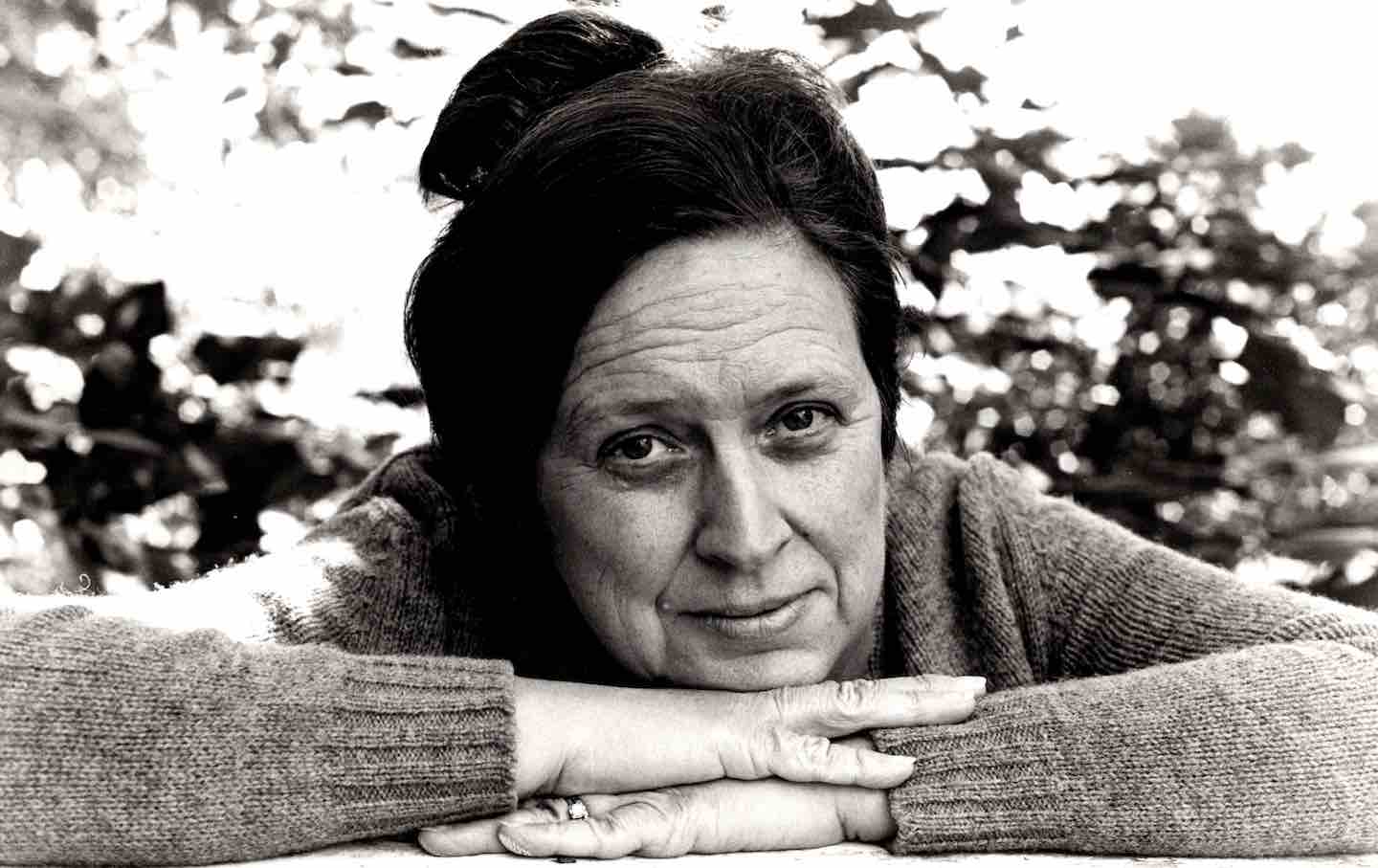
The Concrete Poetics of Mary Ellen Solt The Concrete Poetics of Mary Ellen Solt
Her writing toed the line between fine art and poetry, asking readers to think of language as a multidimensional tool of communication and politics.
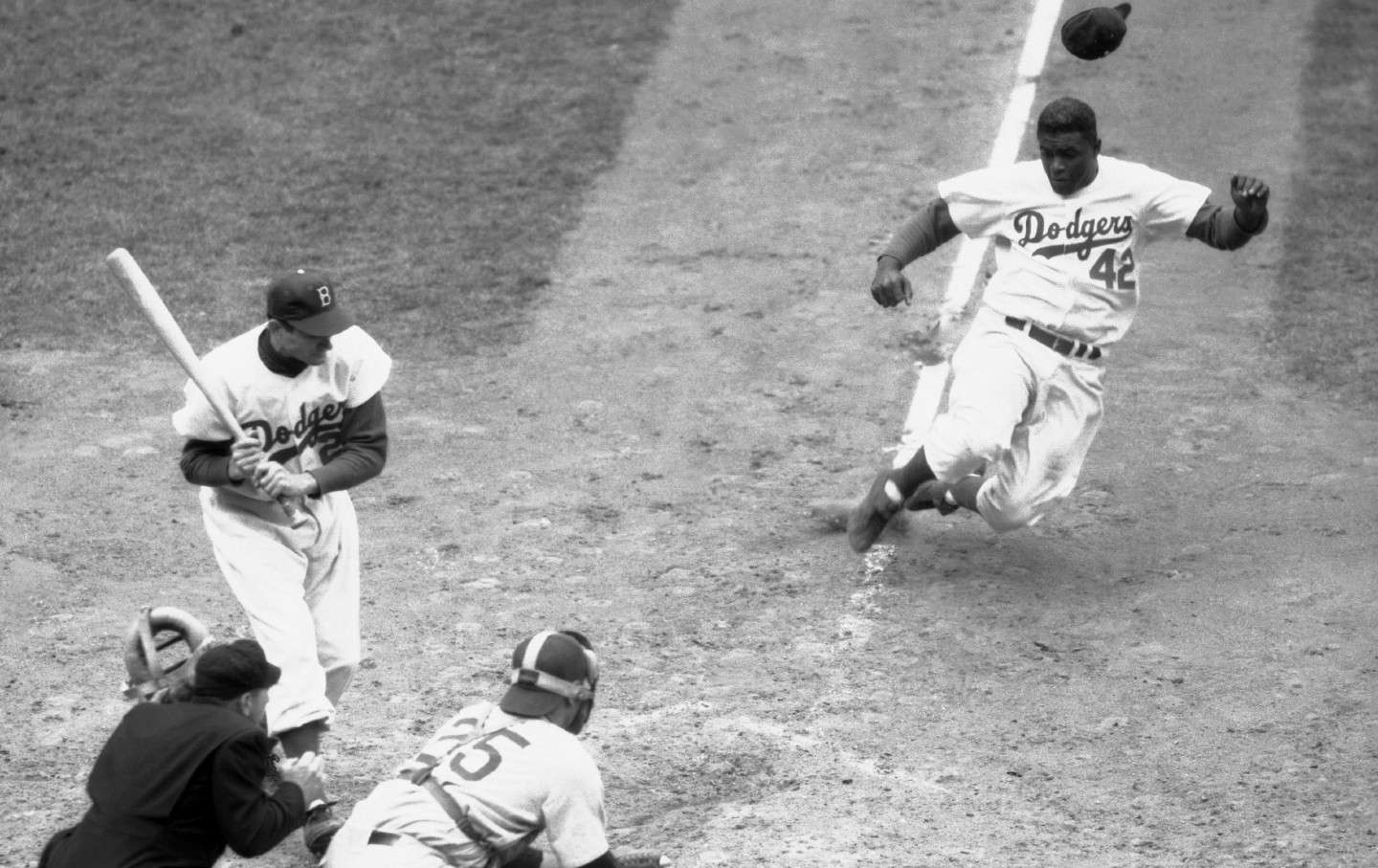
Brooklyn Dodger 1, Draft Dodger 0 Brooklyn Dodger 1, Draft Dodger 0
Donald Trump picked on the wrong athlete. Even though Jackie Robinson died in 1972, last week he bested Trump in a contest about the role of racism and the civil rights movement.
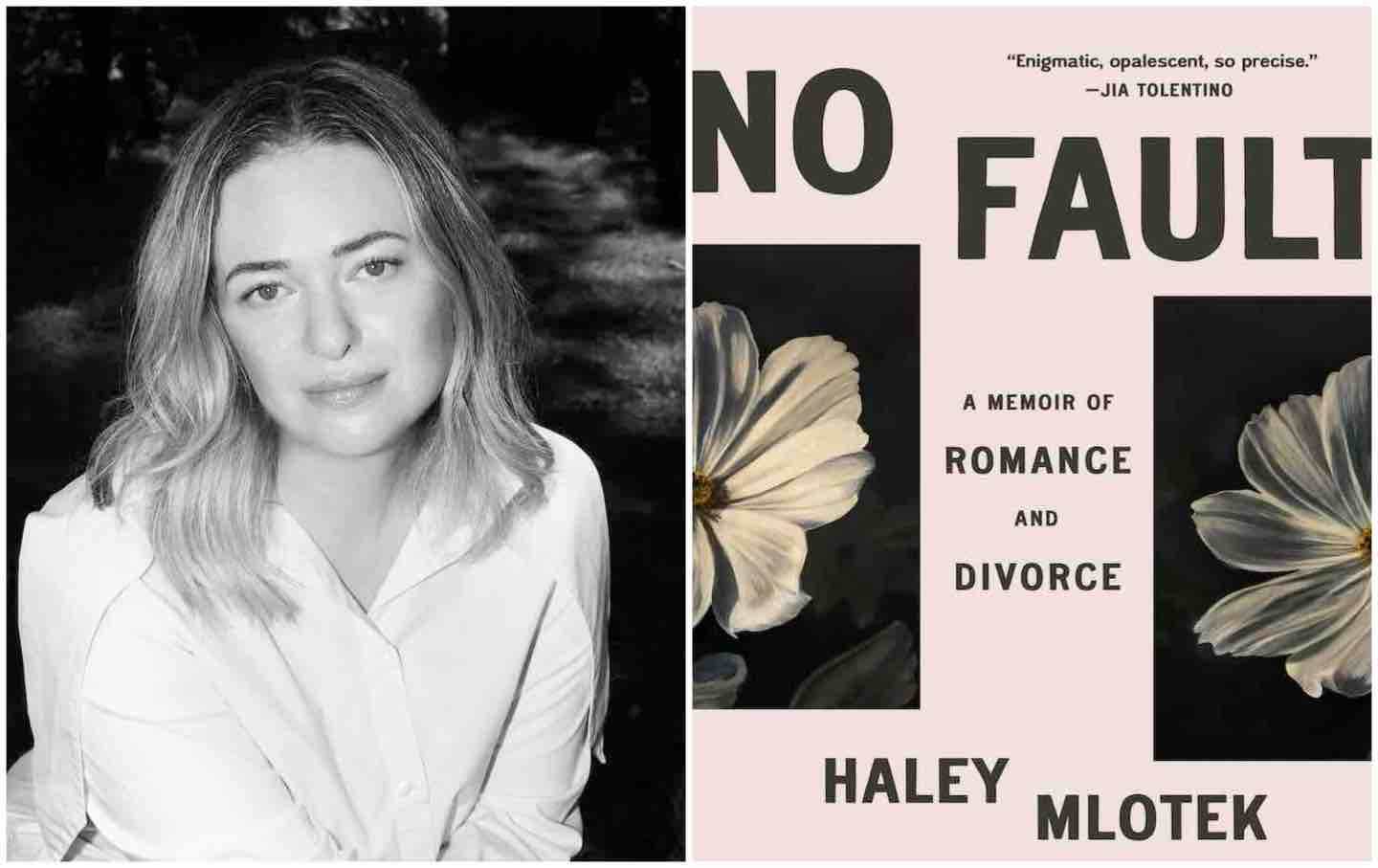
The Art of Separating: A Conversation With Haley Mlotek The Art of Separating: A Conversation With Haley Mlotek
The Nation spoke with the author No Fault, a genre-bending examination of marriage and divorce that is one-part cultural history and one-part memoir.

The Not-So-Golden Age of MAGA Troll Comedy The Not-So-Golden Age of MAGA Troll Comedy
In a blind rush to appease a phantom Trump demographic, media executives and billionaire owners are granting influential platforms to bigots, hacks, and panderers.
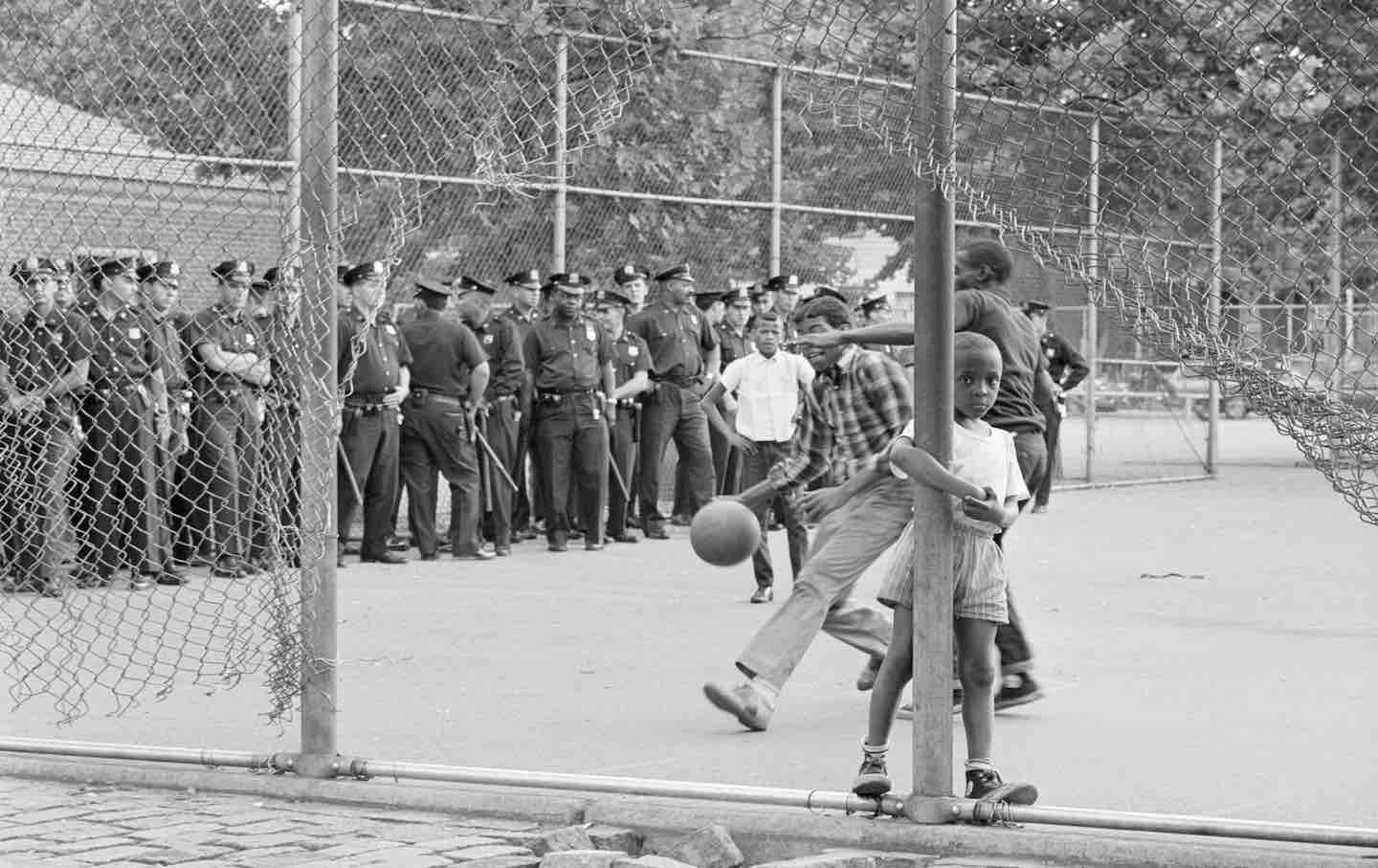
How White-Collar Criminals Plundered a Brooklyn Neighborhood How White-Collar Criminals Plundered a Brooklyn Neighborhood
Stacy Horn’s Killing Fields documents how East New York was ransacked by the real estate industry and abandoned by the city in the process.

When They Came for Columbia University When They Came for Columbia University
The university has become the Trump administration’s test case for the largest assault on higher education since the McCarthy era. Sadly, it has notably failed to defend itself.


